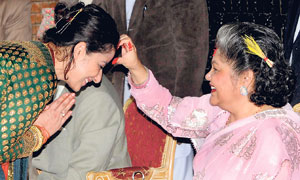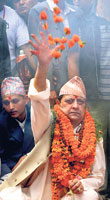KATHMANDU, (AFP) -Legend has it that when Nepal's first king invaded what was to become the capital, Kathmandu, he did so during the autumn festival period, confident its inhabitants would be caught unprepared.
In recent weeks, some Nepalese have been wondering whether his descendant -- deposed king Gyanendra Shah -- might not have the same sort of idea.
 |
| In this photograph taken on October 17, 2010, former Nepalese Queen Komal Shah offers a traditional Hindu tika, a red vermillion powder mixed with curd and rice and put on the forehead as a blessing, to Nepalese Bollywood actress Manisha Koirala at her residence in Kathmandu. AFP |
Gyanendra stepped down from the throne in June 2008 when the country's parliament voted to abolish Nepal's 240-year-old Hindu monarchy, transforming the country into a secular republic.
In the two years that followed his removal from the throne Gyanendra kept a low profile, rarely speaking to the media and confining himself to his hunting lodge on the outskirts of Kathmandu.
But in recent weeks the erstwhile monarch and his son, former crown prince Paras Shah, have appeared at a series of engagements, raising speculation that the family may be eyeing a return to public life.
During this month's Dashain festival, the most important of the year in majority-Hindu Nepal, Gyanendra visited more than 10 temples across the country in just two days.
The 63-year-old former king, traditionally revered as an incarnation of the Hindu god Vishnu, was greeted wherever he went with chants of "long live our king" and "our king, our country, dearer than our soul".
Most observers agree that a return to power is unlikely -- by the time Gyanendra left the throne, the monarchy was highly unpopular in Nepal, where millions live below the poverty line.
He acceded to power in 2001 after a palace massacre in which most of the royal family died at the hands of the former crown prince, who then turned his gun on himself.
Gyanendra became deeply disliked when he seized direct control of the nation in 2005, claiming mainstream parties had failed to tackle a Maoist insurgency and were corrupt.
But analysts say the current political crisis -- Nepal has been without a fully functioning government since the prime minister stepped down in June -- may be fuelling nostalgia for the relative stability of the monarchy.
"They (ex-royals) are trying to capitalise on the seemingly widespread discontent with Nepal's political parties and growing public anxiety over a series of political deadlocks," political commentator Yubaraj Ghimire told AFP.
"For more than a year, they kept quiet and led the life of a normal citizen. What they are doing now has a strong political taste to it.
"The frequency of his (Gyanendra's) recent visits and the influence he exhibits, the manner of full visibility that he does these things, I don't think it's an innocuous move," he said.
Paras, who as crown prince was notorious for his playboy lifestyle, moved to Singapore after the abolition of the monarchy but has now returned to Nepal, where his wife has launched a fund to help deprived women and children.
In a series of recent media interviews, he has expressed regret for his past misdeeds and hinted at a return to public life. "My father left the throne for the people. Anything can happen if it is what the people want. The monarchy could return," the Nepali-language daily Naya Patrika quoted him as saying.
The idea of a figurehead monarch without power has some support, notably among Hindu devotees who still view the former king as their religious leader.
 |
| In this photograph taken on October 9, former Nepalese King Gyanendra Shah performs a ritual during a worshiping ceremony of the Hindu goddess Banglamukhi at a temple in Kathmandu. AFP |
On October 18, the day when the king for centuries gave blessings to the people, thousands of people lined up outside Gyanendra's house to receive the traditional vermilion tika on their foreheads.
Speaking to journalists afterwards, Gyanendra refused to comment on the protracted political deadlock in Nepal.
But he said he was saddened by the "increased suffering of the people" brought about by what he called a deterioration in law and order and the weakening of the already fragile economy.
"Put your political questions to the members of parliament. The time has not yet come for me to speak on those issues," he said. "I want to work for the benefit of the people and the country."So far, there have been no clashes between the former king's followers and supporters of the Maoists, who waged a decade-long insurgency to try to topple the monarchy and who now hold the highest number of seats in the parliament.
But religious festivals threaten to become a flashpoint. Some devotees say the ex-king should be allowed to maintain his role as spiritual leader and argue that the president, his successor as head of state, has no place at religious ceremonies.
Last month, the caretaker government sparked a public row when it asked Gyanendra not to attend a festival traditionally overseen by the king, saying it could not guarantee his security.
Veteran royal-watcher Kishor Shrestha believes that the family could use religion to bolster their position.
"The monarchy in Nepal flourished due to deep-rooted religious beliefs that had been carefully nurtured for years," said Shrestha, editor of the Nepali-language tabloid weekly Jana Aastha. |



